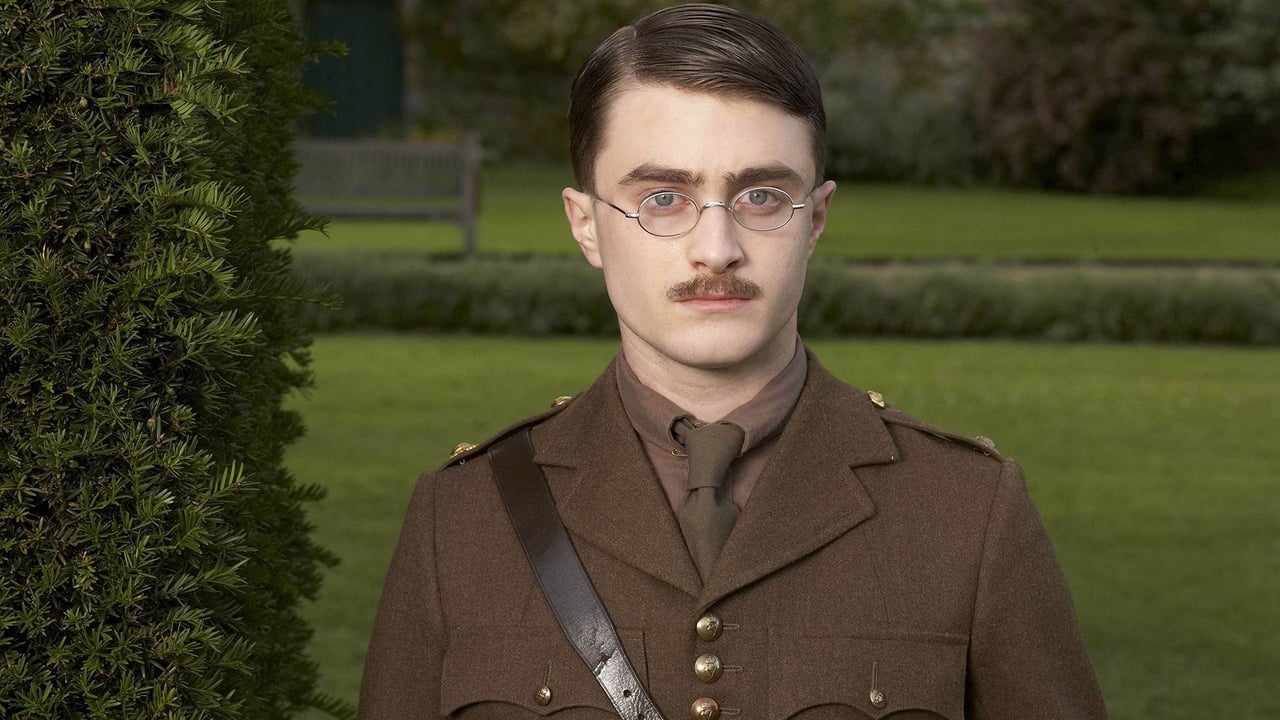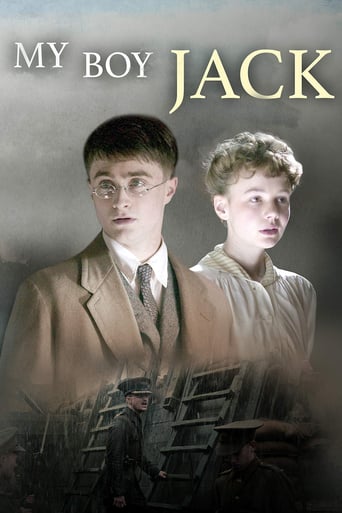Breakinger
A Brilliant Conflict
Fairaher
The film makes a home in your brain and the only cure is to see it again.
Hattie
I didn’t really have many expectations going into the movie (good or bad), but I actually really enjoyed it. I really liked the characters and the banter between them.
James Hitchcock
Although Rudyard Kipling was a poet of genius, he is also one of the most controversial figures in English literature, largely because of his close association with British imperialism. Yet to my mind the greatest blot on his reputation is not his support for the British Empire- an institution which had more merits than many of its detractors are willing to allow- but his passionate advocacy of British entry into the First World War, something motivated less by "King and Country" patriotism than by an obsessive hatred of Germany and the German people. "My Boy Jack" examines the relationship between Kipling and his son John, who died in the war; John Kipling is always referred to as "Jack" in the film, although there has been some debate as to whether he was ever called Jack in real life. The title, however, derives from Kipling's bleak and haunting poem, written to express his grief at his son's death:-" 'Have you news of my boy Jack?' Not this tide. 'When d'you think that he'll come back?' Not with this wind blowing, and this tide. When war breaks out in 1914, Jack is sixteen years old, and like many young men of his generation is eager to serve his country in the armed forces. Unfortunately, he suffers from poor eyesight and is turned down on that ground by both the Royal Navy and the Army. Kipling, however, has powerful friends, including King George V and the famous General Lord Roberts, and by pulling strings is able to obtain Jack a commission as a Second Lieutenant in the Irish Guards. Despite his youth and his disability, Jack proves an exemplary officer; he is a disciplinarian, but fair and popular with his troops. He is also courageous, as he is to prove when in September 1915, the day after his eighteenth birthday, he is ordered to lead his platoon into action in the Battle of Loos. During the attack, however, he disappears and, beyond a telegram to say that he is missing in action, the family hear nothing about him for the next two years. The rest of the film deals with the efforts of Kipling and his American wife Carrie to find out what has happened to their son and their grief as they gradually come to accept that he will not be returning from the war. Rudyard Kipling is played by David Haig, who also wrote the play on which the film is based. Haig certainly bears a close resemblance to the real Kipling, and although his tone of voice and testy manner occasionally reminded me a bit too much of John Cleese's Basil Fawlty, it was overall a moving performance, especially in the later scenes when the ardent jingoist gives way to the anguished father, haunted not only by grief but also by guilt at the part he played in obtaining his son a commission. Daniel Radcliffe, who plays Jack, and Kim Cattrall, who plays Carrie, are both actors who might suffer from typecasting, Radcliffe struggling to escape the shadow of Harry Potter and Cattrall that of Samantha in "Sex and the City". Even away from Hogwarts Radcliffe seems doomed to play mild-mannered, bespectacled teenagers. Cattrall here shows that she can play in serious dramas and that her range as an actress is wider than I had previously suspected; even so, I doubt if in real life Carrie Kipling had quite so much of the "sexy older woman" about her. I have never seen Haig's original play, but I understand that it continued to follow Kipling's life into the 1930s. The film does not, but ends when Kipling and Carrie track down one of Jack's platoon who tells them how their son died. I think that in this the film missed an opportunity to examine the wider question of Kipling's guilt, not his guilt as a father who sent his son off to war, but his guilt as an opinion-former who helped to whip up war-fever in 1914, when he was an immensely popular and influential figure. We never learn whether Kipling ever regretted his role in creating a climate of hatred against Germany. Kipling learns that Jack died bravely leading an assault on a German machine-gun position; by the standards of 1915, or even 1918, he was a hero who had selflessly given his life in a noble cause. By the time Kipling himself died in 1936, however, the world was starting to look very different. During the First World War no great ideological gulf had separated the two sides, and the leaders on both sides had justified their decision to go to war through a campaign of increasingly hysterical hate-propaganda which proclaimed that only the total victory of Our Side (Good) over Their Side (Evil) could ensure peace, freedom and the survival of European civilisation. After victory in 1918 Britain and her allies pretended that these noble ideals had finally been achieved, but by the 1930s it had become clear that all the war had achieved was to test that civilisation close to destruction, to facilitate the rise of totalitarian ideologies and to pave the way for a second conflict which threatened to be even more destructive than the first. (To Kipling's credit, he was, at the end of his life, one of the first in Britain to see the dangers of Nazism). The patriotic rhetoric of 1914, and the ideals for which John Kipling had died, were starting to look very hollow. 7/10
didi-5
David Haig wrote and starred as Rudyard Kipling in 'My Boy Jack', a drama about the brief life of John Kipling, who went to war despite his appalling eyesight and died in the trenches as a teenager.Jack is played by Daniel Radcliffe, who carried all the baggage of being better known as Harry Potter - however his performance is understated, moving, and well crafted. He also has a resemblance to Haig which makes it all the more convincing that they are father and son.The real revelation of this drama though is the casting of Kim Cattrall, Sex and the City's Samantha Jones, as Jack's mother - she is brilliant and this film proves she really can act.The film presents the realities of war without sentiment, and also does justice to the reputation and work of Kipling. Excellent viewing.
beregic
yet again , i am very pleased with a British production. while the plot and the dialogs are quiet good (quiet great blend of realism,idealism and at times original take on conservatism in its both "old" and "new" forms forms - interesting parallel to be noticed on this "aspect"), the movie's straight is found in exceptional acting(it does make a difference when one has to start his or her acting career in theatrics and "on stage", and not being "picked up" for having a "pretty face", or as trivial things as such). while the plot is very "dear" to me in its subject matter, i got distracted by David Haig awesome performance as the father and Kim Cattrall( i would have never took her as a serious actress on the washed-up commercial "sex and the city")as a very NATURAL mother.in my opinion the movie's punch line is actually delivered by Carey Mulligan as jack's sister...i do not feel like writing much at the moment; in short, this feature gives the vibe, and plays as a periodical drama (the cars are a bit too "advanced" for 1910's years), plays accordingly, yet it cultivates the viewer's attention and his/her own thoughts and ideological views on God,king,country and Family.it is a movie for mature viewing , yet any ages would find something "sweet" about it; guaranteed.yes is true; while "made for TV", this production beats down most "blockbusters" of our time. nothing commercial to be found here, which is GREAT; only exceptional acting allowed!(Daniel Radcliffe is the only one that does not seem in sync at times, but that comes out OK since he is suppose to be "naive".also he is actually a secondary character, at face value, as far as the plot goes.)i only give 9 stars because the way that King George, played by Julian Wadham, is portrayed and which goes against the features "principles". also for certain political implications i do not fully agree with
HallmarkMovieBuff
There are no ladies knitting back home in the capitals of Europe, but "My Boy Jack" does a topnotch job of portraying the horrors of World War I by focusing on one particular drawing room in England as Rudyard Kipling, his wife and daughter await word of the fate of son Jack, "missing, presumed wounded," in his first battle one day past his eighteenth birthday.Familiar with David Haig only as the bumbling Detective Inspector Grim in the British comedy series, "The Thin Blue Line," I had no idea he could act so dramatically, let alone write so moving a piece as this. Of all the "Masterpieces" on public TV, this is one of the most deserving to be seen.Young Daniel Radcliffe, in the middle of his run as the lead in the Harry Potter movie series, turns in a surprisingly effective performance in the title role here, a role quite different from that of the schoolboy wizard. And young Carey Mulligan, who's become nearly ubiquitous as somebody or other's daughter in U.K. dramas shown on American TV, is equally affecting as the Kipling daughter, Elsie.U.K.-born, Canadian-bred, and U.S.-trained (at least in part), Kim Cattrall plays Kipling's American wife, with the accent to match. This piece was shown as a "Masterpiece Classic" on America's PBS, followed by behind-the-scene interviews with the three principals, Haig, Radcliffe, and Cattrall. Cattrall's interview was perhaps the most articulate of the lot, which may have been a surprise to viewers familiar only with "Samantha", Cattrall's sexpot in The City (NYC) from the popular HBO series.All in all, VERY highly recommended.

